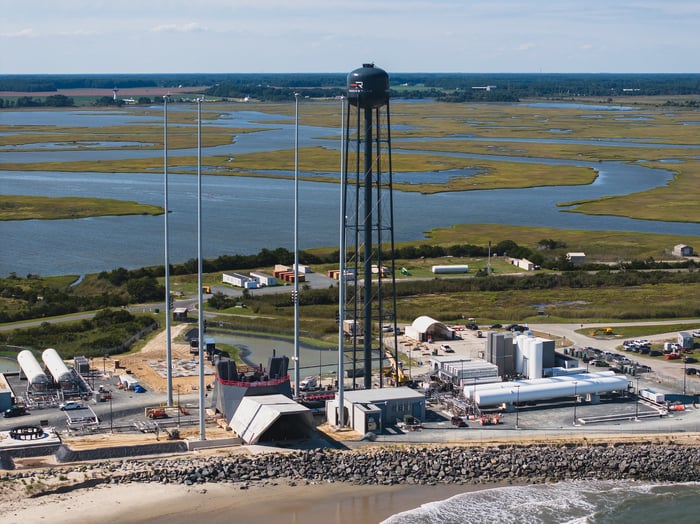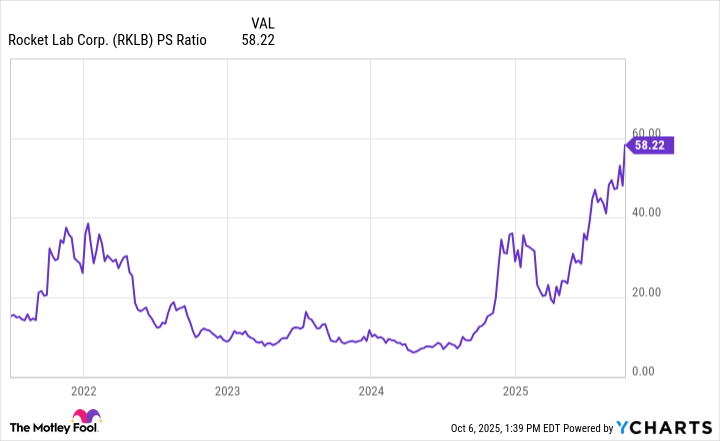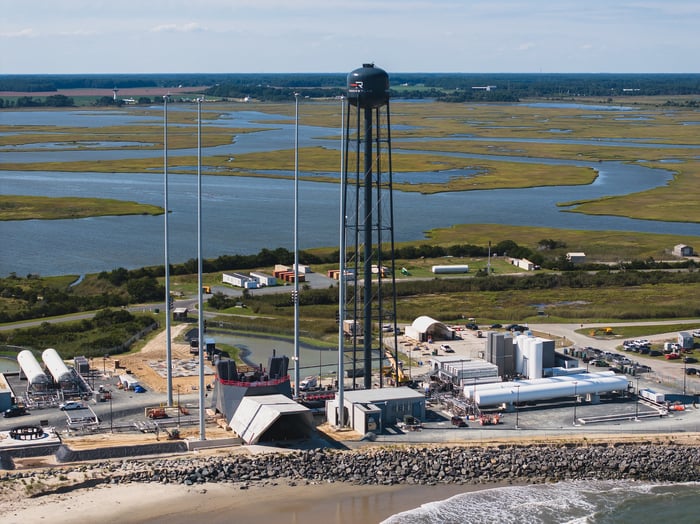Rocket Lab has big plans for Neutron, for Virginia, and for space.
In a week that saw the S&P 500 lose value, one stock in particular, space rocket operator Rocket Lab (RKLB 1.42%), glowed a bright shade of green as it rocketed to close the week 9.5% higher on Friday.
And I know why.
Because I was there to see it.

Image source: Rocket Lab.
Welcome to Virginia, LC-3
On Thursday morning, Aug. 28, Rocket Lab officially opened its third “launch complex” in the world, LC-3, at the Virginia Spaceport Authority’s Mid-Atlantic Regional Spaceport on Wallops Island, just off the Virginian eastern seaboard.
LC-3 will be home to Rocket Lab’s newest and biggest rocket, the 141-foot-tall, methane-and-liquid oxygen-fueled Neutron. Capable of lifting 13 metric tons to low Earth orbit, Neutron will be 43 times more powerful than its little brother (and Rocket Lab’s current only rocket), the Electron. Neutron is scheduled to make its inaugural test flight from LC-3 later this year.
Of course, all of this we already knew about Neutron. We’ve know this since Rocket Lab CEO Sir Peter Beck promised the rocket was coming, four years ago. But here are three things you probably didn’t know about Rocket Lab stock and Neutron., things I only learned myself by attending the LC-3 ribbon-cutting last week.
From MARS to Mars
As Virginia Gov. Glenn Youngkin pointed out in his opening speech before assisting with the ribbon-cutting, Neutron will be launching from a site at the Mid-Atlantic Regional Spaceport — “MARS,” the spaceport. And as CEO Beck observed, bigger rockets can send bigger payloads farther distances — including to Mars, the planet.
Rocket Lab actually already has two satellites built and ready to go to Mars, as part of the ESCAPADE science mission for the University of California Berkeley’s Space Science Laboratory and NASA. What it hasn’t had is a rocket big enough to get them there, and delays caused by trying to hitch rides on other companies’ rockets — SpaceX’s Falcon Heavy and Blue Origin’s New Glenn — have delayed the mission.
Neutron, when it’s ready, could solve that problem by giving Rocket Lab a way to get to Mars under its own power.
Targeting SpaceX
With 43 times the payload capacity of Electron, which can itself often carry multiple small satellites at a time to orbit, Rocket Lab’s Neutron rocket is often described as ideal for the deployment of Earth orbit satellite constellations. Rocket Lab’s most recent descriptions of the medium-lift rocket, however, suggest the company is preparing to compete with rivals such as SpaceX and Northrop Grumman (NOC 0.36%) in the “cargo resupply” market as well.
Resupply whom, you may ask? Well, the International Space Station is the party most obviously in need of regular resupply runs, and currently, SpaceX and Northrop Grumman are fulfilling that function. NASA has indicated openness to allowing other companies to bid on Commercial Resupply Services contracts, however, awarding one to Sierra Nevada Corporation in 2016, for example. Nearly a decade later, Sierra Nevada has yet to actually perform a resupply mission.
Seems to me that opens up a gap that Rocket Lab may soon be able to fill.
Uncle Sam is looking for a few good astronauts
Arguably the biggest reveal of last week’s LC-3 opening, though, was a heavy hint Rocket Lab dropped as to a previously unexpected aspiration: putting astronauts in orbit.
Describing the missions it hopes Neutron to perform once it starts launching, Rocket Lab named all the things we’ve already discussed — launching constellations, visiting other planets, “and eventually human spaceflight,” too.
This revives an early hope that Neutron might give NASA and other space-users a third way to send astronauts to space, in addition to SpaceX’s Crew Dragon and Boeing‘s (BA -0.54%) ill-starred Starliner.
Admittedly, Rocket Lab stopped short of giving any real detail on its plans to develop a human-rated spacecraft for Neutron to carry. Just the hint it did drop at the LC-3 opening, though, already has investors talking about what Rocket Lab’s plans might be along these lines, which could run the gamut from helping to keep space stations crewed, to sending astronauts to the moon or Mars, or even conducting space tourism around Earth.
Stay tuned. As soon as I know more, so will you.





